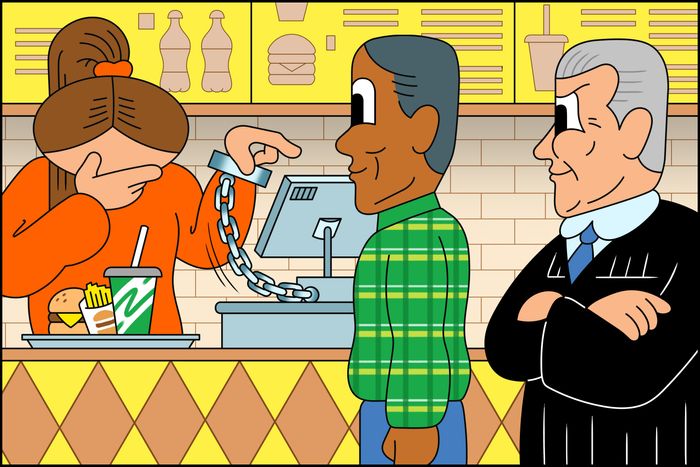This article was featured in One Great Story, New York’s reading recommendation newsletter. Sign up here to get it nightly.
It was a simple order: white rice, chicken, sour cream, and cheese. No pinto beans or veggies, no salsa or guac. Just a pile of basic burrito-bowl ingredients in varying shades of white. There should have been no room for drama.
The order came into the Chipotle in Parma, a working-class suburb of Cleveland, on a Tuesday night last September. The dinner rush was on, and like pretty much every restaurant coming out of the COVID era, this Chipotle was short-staffed. The line wrapped around the dining area all the way to the door and was moving so slowly that one customer, Rosemary Hayne, decided to try pulling a modern trick: She opened the Chipotle app on her phone, placed her order, and stepped out of line.
Emily Russell was pleasantly surprised when she heard the sentence. “I just didn’t want her to get away with a slap on the wrist,” Russell said. She had worried that the judge might let Hayne off with a fine, and liked the idea of Hayne getting a taste of her life, even if she wouldn’t get the full experience. “I was working 70 hours a week, so she was lucky just to be working her 20,” Russell said. She knew that “jail wasn’t easy,” but believed that working a job like hers was even harder. Anywhere Hayne worked was likely to be just as understaffed and chaotic as her Chipotle. A few months after the burrito-bowl incident, two Chipotle customers in North Carolina beat up an employee who told them that she would have to charge them for extra chicken.
In fact, Hayne had been coming back to Russell’s Chipotle. “I went there a week later,” Hayne told me when we spoke a few months after the incident. She usually sent her daughter inside to pick up the food. Hayne wasn’t looking to get recognized for what she had done, either.
When Rosemary Hayne came into Judge Gilligan’s courtroom, he had served on the bench in Parma for 30 years. Maybe he was just getting old, but it sure felt like he was seeing more people coming in for inexplicable behavior. In 2020, Gilligan had adjudicated a case in which a 24-year-old woman climbed through the drive-through window of a McDonald’s and attacked three employees because there was no cookie in her meal. He really did blame the Real Housewives, which he had cited at Hayne’s sentencing. “That kind of probably phony reality show makes people think this is really how people behave,” he said.
For Russell, the encounter with Hayne had affected her life in unforeseen ways. Going viral for having a burrito bowl thrown in your face was a confusing, humiliating experience, and she still thought about the incident pretty much every day. The manager of her Chipotle quit a few weeks after the burrito-bowl attack, and Russell was asked to take on the manager’s responsibilities, albeit without a new title or a raise. When she asked for one, the company offered to bump her hourly rate by ten cents. “I was making $19.49,” Russell told me. “So I went up to $19.59.” Russell quit a few weeks later. The indignity, on top of all the stress she had endured going back to work, had spoiled a job she loved where the customers showed no signs of becoming more agreeable. Earlier this year, Chipotle workers were up in arms over a “stressful and dehumanizing” TikTok meme that encouraged people to make sure employees didn’t skimp on their burritos by filming them with their phones along the buffet line, rather than simply asking nicely for an extra scoop of carnitas.

